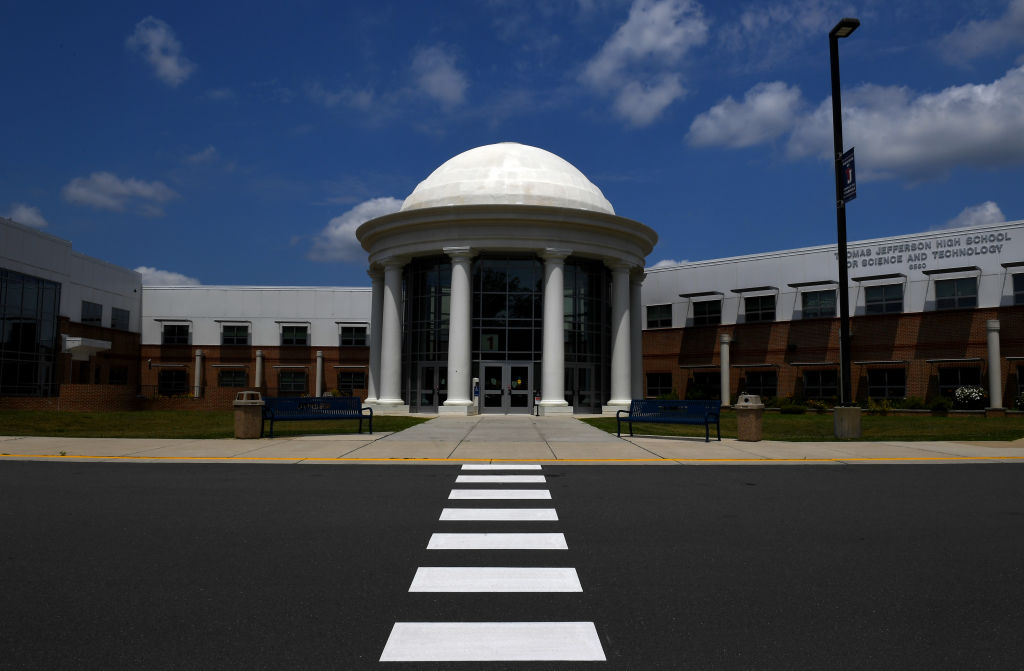Thomas Jefferson High School for Science and Technology, one of the top public schools in the US, has seen a major decline in academic achievement since implementing new admissions standards in pursuit of racial equity in 2020.
In the days after George Floyd’s death, leaders began assessing the underrepresentation of black and Hispanic students at the magnet school, and discussed how to move “towards greater equity, to be clearly distinguished from equality.” Soon after, the school updated its highly competitive admissions process, replacing standardised tests with a holistic evaluation that rewarded students on the basis of having attended underrepresented middle schools and qualifying for free lunch — considerations that critics have called racial proxies.
School leaders had repeatedly complained that the student population, which was majority Asian-American, did not match the racial demographics of the surrounding area. After the implementation of new admissions metrics, the admission of Asian students declined from 73% to 54%. Critics, including parents of Asian students, have pointed to this statistic as evidence of discrimination.
In addition to changing demographics, TJ’s academic output declined drastically. The school tumbled down the national rankings of top public high schools, falling from the #1 to the #14 slot in just four years.
TJ previously boasted 157 semifinalists for the prestigious 2020 National Merit Scholarship, a number that stayed fairly consistent until this year. But the number fell by nearly half for the current senior class, students who were admitted in 2021 under the newly implemented race-conscious admissions rules. Only 81 TJ students were semifinalists for the 2025 award.
The changes have not gone unopposed. Coalition for TJ, a group of community members including some staff and parents, filed a lawsuit against the school which worked its way through the legal system before it was ultimately rejected by the Supreme Court earlier this year. Justices declined to weigh in on a federal court’s ruling that no discrimination had occurred so long as Asian students remained overrepresented.
“Since TJ stopped admitting students based on their individual academic abilities, it’s absolutely no surprise that TJ is no longer the academic powerhouse it once was,” Pacific Legal Foundation’s Erin Wilcox, lead attorney in the case against the school district, told UnHerd.
Declining achievement at TJ is only the latest scandal plaguing Fairfax County Public Schools. Located in the wealthy, predominantly liberal Virginia suburbs of Washington, DC, FCPS has been enmeshed in controversy for years over its Left-wing activities. School board meetings have erupted into chaos due to controversies involving racial, sexual and gender issues in classrooms, much as they have in neighbouring school districts, as K-12 education has come to dominate the US culture wars.
For the Left side of the education dispute, the pursuit of equal outcomes among racial groups is a key goal, which has driven both changes to admissions standards for competitive schools and the elimination of advanced courses in others. The admissions policies implemented in 2020 at TJ remain in place, and schools in several other elite zip codes have implemented similar policies, including in Boston, Montgomery County, Maryland (another DC suburb), and New York.
The Fairfax County School Board was contacted for comment.











Join the discussion
Join like minded readers that support our journalism by becoming a paid subscriber
To join the discussion in the comments, become a paid subscriber.
Join like minded readers that support our journalism, read unlimited articles and enjoy other subscriber-only benefits.
Subscribe